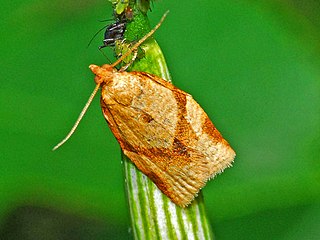
The Archipini are a tribe of tortrix moths. Since many genera of these are not yet assigned to tribes, the genus list presented here is provisional.

Pandemis cerasana, the barred fruit-tree tortrix, is a moth of the family Tortricidae.

Pandemis heparana, the dark fruit-tree tortrix or apple brown tortrix, is a moth of the family Tortricidae.

Epinotia solandriana is a moth of the family Tortricidae. It is found in Europe, China, Korea, Japan, and Russia.

Spilonota ocellana, the bud moth, is a moth of the family Tortricidae. It is found in the Palearctic realm, from North Africa and Europe to Iran, eastern Russia, China, Korea, and Japan. It is also present on Madeira and in North America.

Archips rosana, the rose tortrix, is a moth of the family Tortricidae. It is found in both the Palearctic and Nearctic realms.

Clepsis consimilana, the privet tortrix, is a moth of the family Tortricidae.

Paramesia is a genus of moths belonging to the family Tortricidae.
Meridagena is a genus of moths of the family Tortricidae. It consists of only one species, Meridagena bicerithium, which is found in Venezuela.

Eupoecilia angustana is a moth of the family Tortricidae. It is found in most of Europe to the southern part of the Urals, and across the Palearctic to China, Japan and Korea.

Pandemis corylana, the chequered fruit-tree tortrix, hazel tortrix moth, filbert tortricid or barred fruit tree moth, is a moth of the family Tortricidae. It is found from northern and central Europe to Siberia, Korea and Japan.

Ancylis mitterbacheriana is a species of moth of the family Tortricidae. It is found in most of Europe, except the Iberian Peninsula, most of the Balkan Peninsula and Ukraine.
Congoprinsia is a genus of moths belonging to the family Tortricidae. It contains only one species, Congoprinsia juratae, which is found in the Democratic Republic of the Congo.
Galomecalpa suffusca is a species of moth of the family Tortricidae. It is found in Ecuador.

Falseuncaria ruficiliana, the red-fringed conch, is a species of moth of the family Tortricidae. It is found in China (Xinjiang) and most of Europe. The habitat consists of limestone, heathland and moorland.

Paramesia gnomana is a species of moth belonging to the family Tortricidae, first described by Carl Alexander Clerck in 1759.

Notocelia tetragonana, the square-spot bell, is a species of moth of the family Tortricidae. It is found in China, Russia and Europe, where it has been recorded from most of the continent, except the Iberian Peninsula, the Netherlands, Denmark and most of the Balkan Peninsula. The habitat consists of woodland and scrubland.
Paramesia paracinctana is a species of moth of the family Tortricidae. It is found in Algeria.
Paramesia pygmaeana is a species of moth of the family Tortricidae. It is found in Morocco.

Bactra furfurana, the mottled marble, is a moth of the family Tortricidae described by Adrian Hardy Haworth in 1811. It is found in the Nearctic and Palearctic realms.













